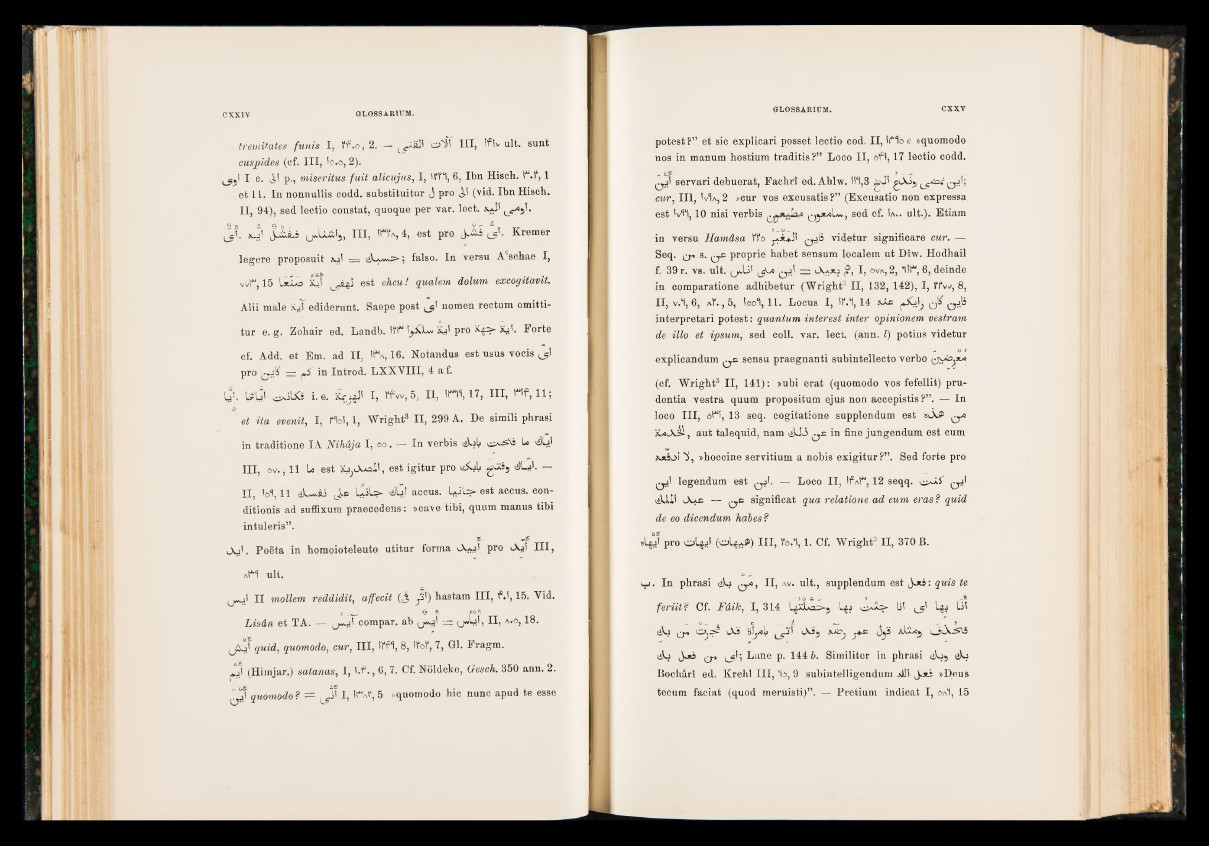
ïi
Ihi
■«:' ?'!
CXXIV GLOSSARIUM.
tremUates funis I , f f .o , 2. — o L Ï I I I , tftv ult. sunt
cuspides (cf. I I I , t*.ô, 2).
I c. i l p., miseritus fuit alicujus, I, tffl, 6, Ib n Hiscb. fi.f, 1
et 11. lu nonnullis codd. su b s titu itu r J pro i l (vid. Ib n Hiscb.
I I , 94), sed lectio constat, quoque per var. lect. * J I ySijl.
1. * j t ß l L i (jaLàëIj, I I I , IfiV, 4, est pro Kre™'
le g e re proposuit *jl = itXaaa;»-; falso. In versu A scbae I,
vvfi, 15 UIa3 xÔÎ e st eheu! qualem dolum excocjitavit.
Alii maie KjI ediderunt. Saepe post f nomen rectum omittitu
r e. g. Zobair ed. Landb. Iffi I_j \J .av * j I pro Xj '. Fo rte
cf. Add. e t Em. ad I I , l y 16. Notandus est usus vocis 05t
pro = f in In tro d . L X X Y III, 4 a f.
Ü . LsGi cjAibCt i.e . y y i I, t‘fvv,5, I I , n i , 17, I I I , n f , l l ;
£
et ita evenit, I, flol, 1, Wrigbt* I I , 299 A. De simili pbrasi
in trad itio n e lA Nihâja I, 00. — In verbis y L ojasSj U y i
I I I , ôv., 11 Lo est X j y y i , est ig itu r pro tjLjL g-U j y ß - —
I I , loi, 11 kilAAÂj y LÛL=- y t accus. LUl> est accus, con-
ditionis ad sufflxum p raeced en s: »cavo tibi, quum manus tibi
in tu le ris ” .
î -î
A j I . P o ë ta in bomoioteleuto u titu r forma vX-ajI pro A j I I I I ,
Afil ult.
040.1 I I mollem reddidit, affecit (3 yîl) bastam I I I , f.i, 15. Vid.
Lisân e t TA. — y w A compar. ab 04.jI = u-Ljl, I I , a . o , 18.
0*.j' quid, quomodo, cur, I I I , Iffi, 8, Ifof, 7, Gl. F ragm .
y (Himjar.) satanas, 1, i .f ., 6, 7. Cf. Nöldeke, Gesch. 350 ann. 2.
y j t quomodo? = ß I, IfiA?, 5 »quomodo bic nunc apud te esse
I
GLOSSARIUM. cxxv
p o te s t? ” e t sic explioari posset lectio cod. I I , Ifilo e »quomodo
nos in manum bostium tra d itis ? ” Loco I I , ofl, 17 lectio codd.
y j l serv ari debuerat, F ao b ri ed. Ablw. "1,3 gJI
cur. I I I , IvIa, 2 »cur vos ex cu sa tis? ” (Excusatio non expressa
est Ivll, 10 nisi verbis yytsiLw, sed cf. Ia,, ult.). E tiam
in versu Hamâsa ffo y j l y é videtur significare cur. —
Seq. 0p y proprie hab e t sensum localem u t Dïw. Hodhail
f. 39 r. VS. ult. 00Li' (0.S1 y j l = g, I, ovA, 2, llfi, 6, deinde
in comparatione ad b ib e tu r (Wrigbt* I I , 132, 142), I, ffvv, 8,
I I , v.1, 6, Af., 5, looi, 11. Locus 1, lf.1, 14 f f O?.'^
in te rp re ta ri p o te s t: quantum interest inter opinionem vestram
de Ulo et ipsum, sed coll. var. lect. (ann. ï) potius v id e tu r
0 3
explicandum y c sensu p ra e g n a n ti su bintellecto verbo
(cf. Wrigbt* I I , 141j: »ubi e ra t (quomodo vos fefellit) pru-
dentia v e stra quum propositum ejus non accepistis ?” . — In
loco I I I , ofil, 13 seq. cogitatione supplendum est »l\S> ysi
X/oA^l, au t talequid, nam A ö y in fine ju n g en d um est cum
**Sl>I 1 , »hoocine servitium a nobis e x ig itu r ? ” . Sed forte pro
y j ! legendiim est y j '. — Loco I I , Ifofi, 12 seqq. kjAÀf y j l
3 kUI AaC — y c significat qua relatione ad eum eras ? quid
de eo dicendum habes?
üL^jÏ pro oL ^ jt (o L^aS>) I I I , fo.1, 1. Cf. Wrigbt* II , 370 B.
0j . In p b ra si A y , I I , a v . u lt., supplendum est ß x i : quis te
feriit? Cf. Fâik, I, 314 L^xLcca, I ß LI 05I L.jj Lil
e Oe . ff - i — - . 3 ^
ehj (j-i bï^^L o ÿ
likj J.*“ CP Ls'i Lane p. 144 6. Similiter in pbrasi A i L
Bocbârî ed. Krehl I I I , lo, 9 subintelligendum JJi J.* : »Deus
tecum faciat (quod meruisti)” . — P re tium indicat I, oaI, 15